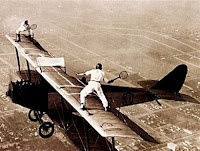 Sports commentators are well known for talking complete bollocks. They are much better than they used to be when the only qualification for the job was a plummy voice, but they still get carried away in the heat of the action like everyone else. However, I keep hearing tennis commentators say something that I just cannot let pass. It is not a slip of the tongue - it is a sentiment they repeat over and over: "One reason X is such a good player is that they make the opponent play one more shot". I don't understand this. In fact I cannot proffer any meaning for it other than "I like player X".
Sports commentators are well known for talking complete bollocks. They are much better than they used to be when the only qualification for the job was a plummy voice, but they still get carried away in the heat of the action like everyone else. However, I keep hearing tennis commentators say something that I just cannot let pass. It is not a slip of the tongue - it is a sentiment they repeat over and over: "One reason X is such a good player is that they make the opponent play one more shot". I don't understand this. In fact I cannot proffer any meaning for it other than "I like player X".Here is a challenge. Suppose that 'making the opponent play one more shot' really does mean something, and I claim that when I play my friend at tennis, I am better at whatever this something is than (say) Lleyton Hewitt (who is often said to have this mysterious quality). Tell me what it is that you are going to measure about our matches that will decide the issue.
On his way to the Wimbledon final this year, Roger Federer knocked out the only men left in the game who are natural serve-and-volleyers (Mario Ancic and Tim Henman). The decline of this traditionally winning tactic is interesting. Back in the 90s, improved racquet technology led to a domination of the grass court game by tall fast servers like Pete Sampras and Goran Ivanisevic, and there arose low mumblings about how the game was being ruined. Many agreed with the suggestion that the game should be purposely slowed down. Ivanisevic won Wimbledon in 2001 at the age of 30, when he was ranked 125 in the world and was only in the competition as a wild card. Whether this was the spark for action by the All England Club or not, it seems that the courts have been purposely slowed down over the years since then, and some players say that the balls are now larger as well, though the authorities deny this. However it has been achieved, the Wimbledon courts have certainly been slowed down. Andy Roddick's fastest serve at Wimbledon this year was 143 mph: 10 mph slower than the record he set at Queens in 2004. The consequences of this may not be what was envisaged - the men's game has become a slogging competition like clay court tennis.
Incidentally, why are Croatians tall?